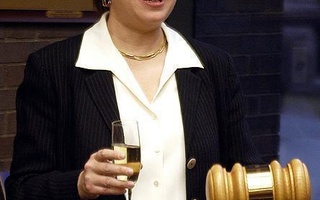Groundbreaking funk musician George Clinton envisioned his band, Parliament-Funkadelic, as a group of groovy interstellar aliens that traveled via the “P-Funk Mothership.” His Mothership landed in Boston last Thursday to unite Clinton with the Berklee College of Music’s P-Funk Ensemble, an orchestra devoted to playing the works of Parliament-Funkadelic. The culmination of a four-day residency Clinton spent at Berklee, the event began with the presentation of an honorary doctorate of music to Clinton and ended in a wildly funky concert. The show succeeded through not only its expert musicianship and production design but also its faithfulness to the sound and energy of Clinton’s genre-defining work.
Before the show, Berklee President Roger H. Brown donned star-studded glitter sunglasses and a gold medallion chain to award Clinton the honorary degree. There are few living artists who so innovatively capture popular music, Brown proclaimed, and the crowd roared in agreement.
Then the curtain rose to reveal the full Berklee ensemble, which quickly demonstrated how fluidly it could traverse the decades of Clinton’s soulful repertoire. After the old-school R&B number “Lonely Island,” which highlighted the crisp falsetto of vocalist Khalil Overton, music director Lenny Stallworth announced that the audience would be taking a journey through time. The group transitioned from 1960 to the 1967-released “Testify,” and Clinton himself reappeared on stage as if summoned by the band’s quickening rhythm. “Testify” climaxed with soprano wails and a dramatic horn finale, The band slid just as smoothly into the ’70s with “Children of Production,” the vocalists eerily chanting, “We love you, Dr. Funkenstein,” over a synthesizer, bass, and horn groove.
The show’s gaudy, psychedelic aesthetic mimicked the theatrics for which Parliament-Funkadelic is known. Bathed in purple light, the beaming ensemble appeared in lime green fur robes, cheetah boots, fringed bell bottoms, tribal face paint, pink tiaras, winged eye makeup, blue fingernails, striped tights, and tie-dyed tops. Clinton strolled onstage in a shiny silver suit and white fedora. What made these stylings so effective was not sheer eccentricity; rather, the spectacle of Clinton and the ensemble’s extravagant stage presence matched the zealous fervor with which they played.
Throughout the show, masterful solos and passionate vocals showcased the group’s skill in handling Clinton’s complex grooves. Guitarists Stefan Kallandar and Lewis Robertson broke out long, intricate solos—one amidst the hyper-kinetic jam of “Alice in My Fantasies” that brought the audience to stomping and dancing, and one played behind the guitarist’s head in the climactic “One Nation Under a Groove.” The vocalists’ versatility shone as they reproduced Parliament-Funkadelic’s wide array of moods and sounds. They shifted between twanging and operatic melodies in “Flashlight,” low, bouncy lines on “Mothership Connection,” and even a surreal interlude in “Aqua Boogie” in which they engaged in playful banter in nasally tones. In “Mothership Connection,” they also showed an ability to sustain one of the most recognizable and challenging vocal lines in P-Funk’s work—the high, swelling chant of “Swing down, sweet chariot. Stop and let me ride.”
As the concert continued, never once did Clinton or the P-Funk Ensemble lose its energy and connection with the audience. By “Children of Production,” the hip-swinging ensemble had the crowd imitating its movements—when they swayed, the audience swayed; when they jumped, the audience jumped. The instrumentals softened to emphasize the percussion in “P-Funk (Wants To Get Funked Up),” and Clinton held the microphone to the audience as it chanted, “Make my funk the P-Funk / I wants to get funked up.” Clinton engaged the audience with call-and-response lyrics in other songs, such as “Mothership Connection” and the sassy “Up for the Down Stroke,” and when the musicians held up signs bearing mantras like “Free Your Mind,” the crowd erupted in cheers.
With every song, the audience moved toward the musicians as if in a trance, though they were soon repelled by Berklee security guards. “Do not attempt to adjust your radio,” one vocalist declared. “We have taken control to bring you this special show. We will return it to you as soon as you are grooving.”
The concert climaxed with a P-Funk classic, “Give Up the Funk (Tear the Roof off the Sucker),” which flowed so smoothly into “One Nation Under a Groove” that the pieces seemed like one single, furious song. The song’s message of unity through funk felt fitting—the entire concert thrillingly captured the organic interplay of music, theatrics, and audience connection that defines Clinton’s work.
The band dragged Clinton out for an encore, “Standing on the Verge of Getting It On.” As Clinton pranced back and forth onstage, one ensemble member held a sign, written on notebook paper, that quoted “Give Up the Funk”: “OMG U Totally turned us mothaz out!”
—Staff writer Alexandra L. Almore can be reached at alalmore@fas.harvard.edu.
Read more in Arts
Clashing Tones Confuse “Color” at ICARecommended Articles
-
 Kagan's Experience, Harvard Ties Draw Scrutiny in Confirmation Hearing
Kagan's Experience, Harvard Ties Draw Scrutiny in Confirmation Hearing -
Journalist Critiques PoliticsRobert Scheer, author, journalist, and editor of the online political magazine Truthdig, challenged his audience to understand the financial sector ...
-
Reliving HistoryThere probably aren’t many things ex-Vice President Cheney and liberal comedian Bill Maher agree on, but one view both men ...
-
Obama Said to Consider Summers for World BankPresident Barack Obama is considering nominating University Professor Lawrence H. Summers to head the World Bank, according to a Bloomberg report published Wednesday.
-
Clinton and the FactsClinton’s approach is exemplary of the kind of honesty that our discourse needs. This is not the phony moderation adopted by so many pundits who crave a veneer of credibility at the expense of factual accuracy, but rather a robust, honest, and, yes, political defense of his party’s vision for America.
-
From Hope to HashtagsWe see Clinton’s move to Twitter as a step toward bringing down walls between ordinary people and decision-makers.













